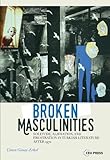Broken Masculinities : Solitude, Alienation, and Frustration in Turkish Literature after 1970 / Cimen Günay-Erkol.
Material type: TextPublisher: Budapest ; New York : Central European University Press, [2022]Copyright date: ©2016Description: 1 online resource (260 p.)Content type:
TextPublisher: Budapest ; New York : Central European University Press, [2022]Copyright date: ©2016Description: 1 online resource (260 p.)Content type: - 9786155225376
- 894/.353309 23
- PL223.M38 G86 2015
- online - DeGruyter
| Item type | Current library | Call number | URL | Status | Notes | Barcode | |
|---|---|---|---|---|---|---|---|
 eBook
eBook
|
Biblioteca "Angelicum" Pont. Univ. S.Tommaso d'Aquino Nuvola online | online - DeGruyter (Browse shelf(Opens below)) | Online access | Not for loan (Accesso limitato) | Accesso per gli utenti autorizzati / Access for authorized users | (dgr)9786155225376 |
Frontmatter -- Contents -- Preface -- Acknowledgements -- Introduction -- CHAPTER 1 Quixotic and Hurt: Victimized Men as a Stable Ground -- CHAPTER 2 On the Post-dictatorial Stage: March 12 by Women Writers -- CHAPTER 3 Masculinity and Modernization: Does Love Emasculate? -- Conclusion -- Chronology of Events Surrounding Three Military Coups in Turkey -- Bibliography -- Index
restricted access online access with authorization star
http://purl.org/coar/access_right/c_16ec
Broken Masculinities portrays the post-dictatorial novel of the 1970s in all its complexity, and introduces the reader to a 1968-era Turkey, a period which challenges Turkey’s now reinforced Islamic image by portraying the quest for sexual liberation and critical student uprisings. Günay-Erkol argues that the literature written after the 1971 coup in Turkey constitutes a coherent sub-genre and needs to be considered together. These novels share a common ground which is rich in images of men and women craving for power: general isolation, sexual-emotional frustration, and a traumatic sense of solitude and alienation. This book is an original and significant contribution to two major fields of study: (1) gender and sexuality with respect to formation of subjectivity through literature, and (2) modern literature and history through the study of Turkish literature. The chief concern in this book is not only literature’s response to a particular period in Turkey, but also the role of literature in bearing witness to trauma and drastic political acts of violence—and coming to terms with them.
Mode of access: Internet via World Wide Web.
In English.
Description based on online resource; title from PDF title page (publisher's Web site, viewed 30. Aug 2022)


